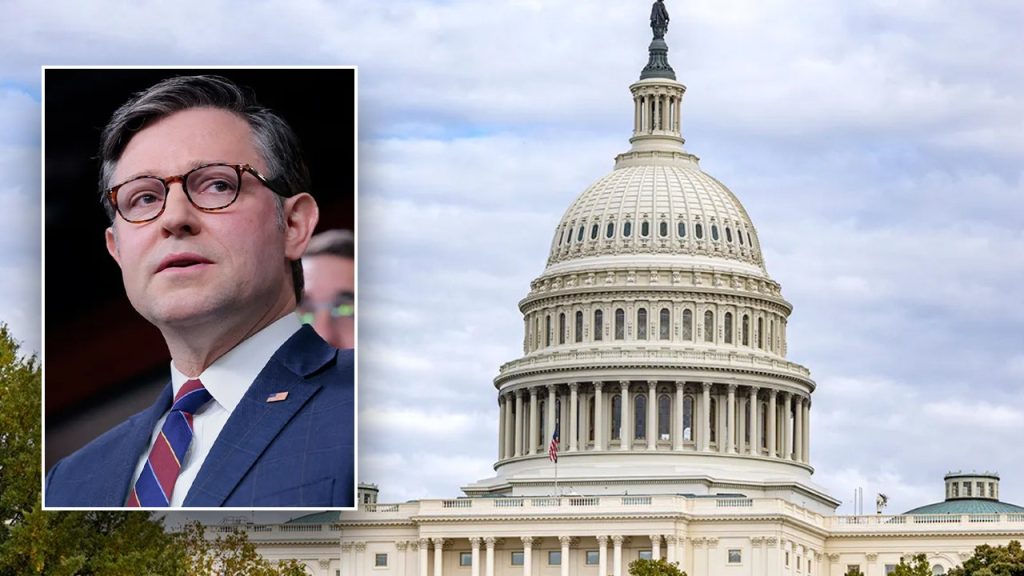House Republicans are currently navigating a complex legislative landscape as they aim to finalize a significant tax cut and spending reduction bill. Despite challenges and debate within their ranks, House Speaker Mike Johnson has expressed confidence in their ability to deliver. As legislators strive to find a compromise among competing interests, the coming weeks are critical for achieving their goals ahead of key deadlines.
| Article Subheadings |
|---|
| 1) Context of Current Legislative Efforts |
| 2) Key Challenges Faced by Republicans |
| 3) The Role of Various Stakeholders |
| 4) The Importance of Compromise |
| 5) Future Implications and Upcoming Deadlines |
Context of Current Legislative Efforts
The ongoing effort among House Republicans to pass a critical tax cut and spending reduction bill comes at a strategic time in the legislative session. Following the recent Kentucky Derby, where the winning horse Sovereignty will not participate in the subsequent Preakness, similar metaphors can be drawn to the scenario facing Congress. House Republicans are currently in what can be described as the final leg of their legislative race, with major decisions looming that will impact fiscal policy. This initiative aims not only to rejuvenate tax cuts but also enforce a reduction in government spending, which is crucial as the fiscal year 2026 approaches.
Key Challenges Faced by Republicans
House Republicans are not unfamiliar with challenges, particularly as they try to push their agenda forward amidst divergent opinions within their party. A recent legislative session saw intense debates about the specific elements that should be included in the proposed bill. The House narrowly passed an earlier version of this framework with a vote count of 216-214, and any dissent among members could jeopardize its chances of success. Representatives from states with higher taxes, such as New York and Pennsylvania, are pressing for provisions like the SALT deduction, which could complicate negotiations going forward. Failing to secure a consensus could lead the legislation to stall, casting doubt on the Republicans’ momentum.
The Role of Various Stakeholders
Different stakeholders are making their voices heard as the House Republicans work to shape this legislation. While House Majority Leader Steve Scalise emphasizes the need to protect certain tax benefits, including the elimination of taxes on tips and overtime, other figures like Rep. Ralph Norman signal the necessity of compromise regarding their fiscal target. They acknowledge that the path will require balancing various interests, including moderates who may demand certain tax provisions and conservatives advocating for deep cuts. Additionally, key figures in the Senate, such as Senate Majority Leader John Thune, have been pulling together commitments that could impact the overall approach taken by House Republicans.
The Importance of Compromise
In order to reach a successful conclusion, House Republicans face the challenge of finding a middle ground. The anticipated exchanges and negotiations highlight the critical nature of compromise in upholding their legislative goals. Johnson has indicated the need for flexibility, suggesting that all parties involved will need to concede certain demands. Moderate voices, such as Rep. Nicole Malliotakis, are advocating for the voice of constituents from high-tax regions to be represented, emphasizing that high local taxes have necessitated calls for relief measures within the bill framework. The trajectory of the negotiations will largely determine the bill’s passage and acceptance.
Future Implications and Upcoming Deadlines
As the legislative journey continues, Republicans are also faced with looming deadlines that could impact their strategies moving forward. The commitment to pass the bill by Memorial Day serves as a key target in their timeline, reminiscent of a racehorse approaching a finish line. The caution raised by figures like House Minority Leader Hakeem Jeffries highlights the skepticism regarding the Republican’s ability to deliver on projections, such as anticipated savings from Medicaid waste. If House Republicans fail to secure decisive wins and consolidate support among divergent factions, they risk losing momentum that could jeopardize their agenda not just for this year, but also for future legislative sessions.
| No. | Key Points |
|---|---|
| 1 | House Republicans aim to finalize a tax cut and spending reduction bill. |
| 2 | Challenges arise from differing opinions within the party. |
| 3 | Moderate Republicans push for provisions that address high state taxes. |
| 4 | The necessity of compromise is critical for legislative success. |
| 5 | The deadline for passing the bill set for Memorial Day. |
Summary
In summary, the forthcoming weeks will be pivotal for House Republicans as they work to finalize a tax cut and spending reduction bill amidst inter-party negotiations and looming deadlines. The legislative maneuvering required to secure passage will take on a high-stakes tone, with the risks of failure potentially exacerbating divisions within the caucus. Continued efforts to foster bipartisan dialogue and inclusive strategies will be essential in shaping a bill that not only meets the expectations of party leaders but also resonates with the public.
Frequently Asked Questions
Question: What are the primary goals of the proposed tax cut and spending reduction bill?
The primary goals are to renew previous tax cuts and initiate significant spending reductions in light of fiscal challenges facing the government.
Question: Who is responsible for negotiating the current framework of the bill?
House Republican leaders, including Speaker Mike Johnson and Majority Leader Steve Scalise, are primarily responsible for negotiating the framework while also considering input from various party members.
Question: What challenges do Republicans face in passing the bill?
Republicans face challenges such as differing opinions among their members, demands from moderates for tax relief provisions, and the necessity to find a balance that will satisfy both conservative and moderate factions.
